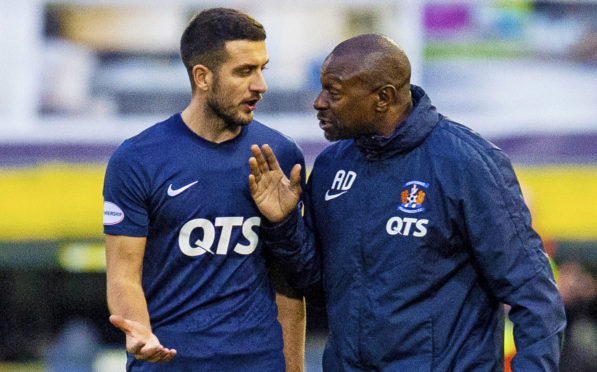
It’s absolutely no surprise that Kilmarnock’s standing in Scottish football has fallen during the first half of the season.
There’s every chance that would have happened if Steve Clarke had turned down the Scotland manager’s job and decided to remain in the Rugby Park hot-seat.
Clarke took the Ayrshire club to their highest league finish since 1966, and he was always going to be a hard act to follow.
Getting a tune out of players who’d previously been no better than mediocre in their performances was quite a trick.
But they had a great chance to build on that success and remain firmly in the Premiership’s top six.
Then they appointed Angelo Alessio as manager.
His arrival – and his departure in December – was one of those strange affairs so regularly thrown up by Scottish football.
The Italian had spent the previous nine years as assistant to Antonio Conte at Juventus, Chelsea and the Italian national team.
It was a left-field appointment, and giving him the sack when Killie were sitting fifth in the top flight was just as odd.
Alessio picked up the Manager of the Month award for October. There has been only one victory since the end of that month.
But where does a club with an average gate of just over 5,000 expect to finish?
STAR MAN
Gary Dicker has been a model of consistency this season.
The Irishman does a superb job of protecting the back-four, winning possession and moving the ball on to attacking players.
It’s the sort of job that Scott Brown and Ryan Jack do so effectively for the Old Firm.
That Killie’s skipper is also their best player illustrates one of their problems.
To improve their league position, they need to start scoring goals.
Killie have only hit the net 17 times in 21 Premiership fixtures.
That’s the same as 10th-placed St Mirren, and only St Johnstone, sitting ninth, have scored fewer, with 16.
Dicker’s contribution helps hugely when it comes to creating an impressive goals-against column.
Rangers and Celtic have the meanest defences, and Kilmarnock are the best of the rest.
A formula that sees a team struggle to score, but not lose many, tends to see them end up around middle of the table.
Killie are currently seventh, and they won’t go much higher unless someone with a bit of attacking flair eclipses Dicker’s performances in the second half of the season.
PROSPECTS
Alex Dyer has been given the manager’s job until the end of the campaign.
He has been at the club for more than two years, and knows what is required.
Expectations soared during his time as Steve Clarke’s assistant, and anything other than a top-six finish will lead to a lot of grumbling among the supporters.
They feel there’s a squad that, with a bit of fine tuning, should be capable of sitting above mid-table.
Killie haven’t scored in their last six matches, and suffered five consecutive defeats before the winter break.
So there has to be a change in their attacking play to stop the rot.
Youssouf Mulumbu was a great source of midfield creativity last season, and bringing him back would provide a big boost to morale.
However, the Congo internationalist has been without a club for six months, and would take time to get up to speed.
Dyer’s top priority has to be to get his hands on a goalscorer.
But he’s not the only boss looking for that.
The January transfer window isn’t the ideal time to recruit a striker.
Anyone available is likely to have had limited playing time in recent months.

Enjoy the convenience of having The Sunday Post delivered as a digital ePaper straight to your smartphone, tablet or computer.
Subscribe for only £5.49 a month and enjoy all the benefits of the printed paper as a digital replica.
Subscribe